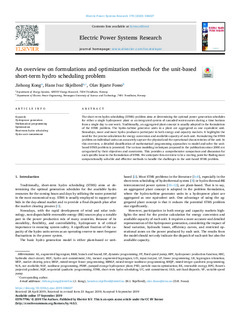An overview on formulations and optimization methods for the unit-based short-term hydro scheduling problem
Journal article, Peer reviewed
Published version
Permanent lenke
http://hdl.handle.net/11250/2619468Utgivelsesdato
2019Metadata
Vis full innførselSamlinger
- Publikasjoner fra CRIStin - SINTEF Energi [1647]
- SINTEF Energi [1771]
Originalversjon
10.1016/j.epsr.2019.106027Sammendrag
The short-term hydro scheduling (STHS) problem aims at determining the optimal power generation schedules for either a single hydropower plant or an integrated system of cascaded watercourses during a time horizon from a single day to one week. Traditionally, an aggregated plant concept is usually adopted in the formulation of the STHS problem. The hydro-turbine generator units in a plant are aggregated as one equivalent unit. Nowadays, more and more hydro producers participate in both energy and capacity markets. It highlights the need for the precise calculation for energy conversion and available capacity of each unit. Formulating the STHS problem on individual units can accurately capture the physical and the operational characteristics of the unit. In this overview, a detailed classification of mathematical programming approaches to model and solve the unit-based STHS problem is presented. The various modeling techniques proposed in the publications since 2000 are categorized by their objectives and constraints. This provides a comprehensive comparison and discussion for each specific issue in the formulation of STHS. We anticipate this overview to be a starting point for finding more computationally solvable and effective methods to handle the challenges in the unit-based STHS problem. © 2019 Elsevier B.V. An overview on formulations and optimization methods for the unit-based short-term hydro scheduling problem

